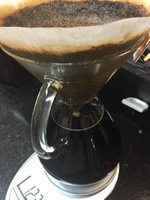In my first book, "Weight Loss Surgery: A Lighter Look At A Heavy Subject," I address coffee. Simply put, I give it to my patients in the recovery room after surgery.
Yet on the internet you see the cry for not using coffee after weight loss surgery. I have to ask - Why on earth? Even one of the organizations I belong to the almighty American Society of Metabolic and Bariatric Surgery says you should avoid caffeine for 30 days after then ask your surgeon. Is there a reason for this? None. They just say it.
Is there a scientific reason? None. Coffee suppresses appetite. Not that much, but a bit.
Coffee is thermogenic - meaning it increases the bodies use of calories.
Maybe some think that coffee causes dehydration. It doesn't. In fact, when it comes to athletes there is evidence that drinking coffee can increase endurance. Since surgery is like an athletic event - it takes energy to heal from it, it takes endurance to go through it.
Is it a clear liquid? Well - the way some of you make it - yes. You know the old joke, "If this is coffee get me tea, if this is tea get me coffee." Clear liquids are used after surgery because of how they behave in the stomach. Coffee behaves like water, so when my patients are on a clear liquid diet, the first things they drink after surgery coffee is on the list.
 |
| Even my son gets coffee in the morning |
 |
| When I travel I bring coffee. So if I was in the hospital you can bet I would brew my own |
 |
| The Aeropress - my portable coffee maker |
 |
| My weekend variety is made with a chemex |
From the ASMBS - here is their word on the topic (not to be taken as the gospel). https://asmbs.org/patients/life-after-bariatric-surgery
1 Kolasa K.M. et al. (2009) Hydration and health promotion. Nutrition Today. 44:190-203
2 Popkin B.M. et al. (2006) A new proposed guidance system for beverage consumption in the United States. American Journal of Clinical Nutrition, 83, 529-542
3 Silva A. M. et al. (2013) Total body water and its compartments are not affected by ingesting a moderate dose of caffeine in healthy young adult males. Applied Physiology Nutrition & Metabolism, 38:626-632.
4 Killer S. C. et al. (2014) No Evidence of Dehydration with Moderate Daily Coffee Intake: A Counterbalanced Cross-Over Study in a Free-Living Population. PLoS ONE, 9(1): e84154.
5 Ganio M.S. et al. (2009) Effect of caffeine on sport-specific endurance performance: a systematic review. Journal of Strength and Conditioning Research, 23(1):315-24.
6 Goldstein E.R. et al. (2010) Caffeine enhances upper body strength in resistance trained athletes. Journal of the International Society of Sports Nutrition, 7 :5

